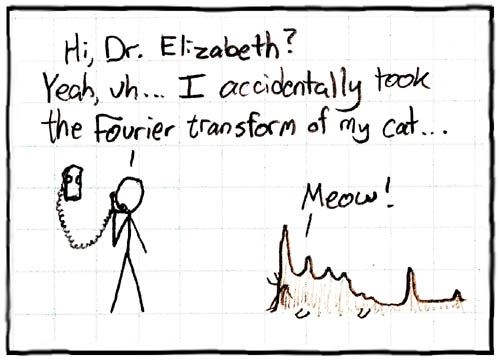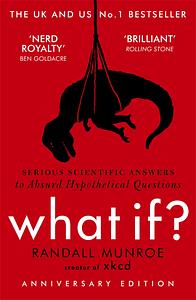You need to sign in or sign up before continuing.
Take a photo of a barcode or cover
3.76k reviews for:
What If?: Serious Scientific Answers to Absurd Hypothetical Questions
Randall Munroe
3.76k reviews for:
What If?: Serious Scientific Answers to Absurd Hypothetical Questions
Randall Munroe
True to xkcd roots, this book is just such a perfect blend of science and humor, set up in perfect little dollops to browse through at leisure.
Funny, informative, and hard to put down. It's amazing what you can learn with silly questions. Munroe's research is its own story as well-that guy is kind of a genius.
Just as good as the other Munroe books I listened to. I took some extra time listening to this one because I felt like binging the last one made me enjoy it a little less. I think that was the right move. I would recommend a chapter or 2 at a time when you want some funny what if's answered.
Wil Wheaton was still fantastic. Strangely I think that he is probably my most listen to reader by quite a bit. He's very good at it.
Wil Wheaton was still fantastic. Strangely I think that he is probably my most listen to reader by quite a bit. He's very good at it.
Since I was reading xkcd 17 years ago, and continue to do so, I don't know how to rate this without rating the whole experience. xkcd is a witty comic about STEM discovery and society and what if? is his longer-form blog which does what it says on the tin: providing serious scientific answers to absurd hypothetical questions.
I was always a big fan of xkcd but found what if? too stressful to read.
Warning, tangent. Skip to the next paragraph if not interested.
The reason being that my university, in an attempt to be with-the-times or weed out those with no head for guestimation, had an exam every year where we were presented with two-to-three absurd questions and would have to formulate our own what-if answers.
The problem is they typically relied on knowing a bunch of trivia. For example one cruel year we were asked: if every house in Scotland had solar panels on its roofs, how much would this reduce the average house-hold bill purchasing from the Grid.
Which is a question with so many elements: roof surface area, average occupancy per house (Scotland isn't the states, many people live in victorian-style townhouses in the big cities), teh angle and orientiation of the roof with respect to the passage of the sun, the variation in daylight across the country and over the year, cost of electricity for an average household, etc.
I made a list of these elements with a justified guess at the numerical factors, made a formula, plugged it all in, and got a D for my efforts. I hated that exam.
So yes, reading that column always made me feel absolutely terrible: what if I too got asked to calculate a lethal dose of neutrinos? Every time I read it I would get sucked into reading papers and taking notes and it always felt like homework.
Maybe this is why only now, 3 years since I left education in all its forms, have I picked up the book. So, good news, the terror and anxiety is gone from the reading experience. Munroe is wry and witty and gets straight to the good stuff with lots of excellent cartoons to help visualise what he's talking about. Some of the stuff at the beginning was a favourite, e.g. the real periodic wall of elements, the time machine, or the Mole of moles. The new continents formed when draining the oceans is also excellent!
There's a scarily prescient question that goes: "If everyone on the planet stayed away from eachother for a fixed period of time could we eradicate the common cold?" and the answer is a resounding no, because there are too many people to truly isolate and viruses are hardy. So that's nice I guess, we couldn't have truly prevented the pandemic from spreading once it hit every continent? Maybe? :(
This is a great book, buy it and have it in waiting area, or put it in your kitchen so you can dip into it frequently whilst waiting for the kettle to boil. And keep reading xkcd, SMBC, and all the other golden oldies.
And if you're currently also struggling through a 'fun' physics exam, I'm sorry, it will get better, and you will at some point in the future be able to enjoy things like this again.

I was always a big fan of xkcd but found what if? too stressful to read.
Warning, tangent. Skip to the next paragraph if not interested.
The reason being that my university, in an attempt to be with-the-times or weed out those with no head for guestimation, had an exam every year where we were presented with two-to-three absurd questions and would have to formulate our own what-if answers.
The problem is they typically relied on knowing a bunch of trivia. For example one cruel year we were asked: if every house in Scotland had solar panels on its roofs, how much would this reduce the average house-hold bill purchasing from the Grid.
Which is a question with so many elements: roof surface area, average occupancy per house (Scotland isn't the states, many people live in victorian-style townhouses in the big cities), teh angle and orientiation of the roof with respect to the passage of the sun, the variation in daylight across the country and over the year, cost of electricity for an average household, etc.
I made a list of these elements with a justified guess at the numerical factors, made a formula, plugged it all in, and got a D for my efforts. I hated that exam.
So yes, reading that column always made me feel absolutely terrible: what if I too got asked to calculate a lethal dose of neutrinos? Every time I read it I would get sucked into reading papers and taking notes and it always felt like homework.
Maybe this is why only now, 3 years since I left education in all its forms, have I picked up the book. So, good news, the terror and anxiety is gone from the reading experience. Munroe is wry and witty and gets straight to the good stuff with lots of excellent cartoons to help visualise what he's talking about. Some of the stuff at the beginning was a favourite, e.g. the real periodic wall of elements, the time machine, or the Mole of moles. The new continents formed when draining the oceans is also excellent!
There's a scarily prescient question that goes: "If everyone on the planet stayed away from eachother for a fixed period of time could we eradicate the common cold?" and the answer is a resounding no, because there are too many people to truly isolate and viruses are hardy. So that's nice I guess, we couldn't have truly prevented the pandemic from spreading once it hit every continent? Maybe? :(
This is a great book, buy it and have it in waiting area, or put it in your kitchen so you can dip into it frequently whilst waiting for the kettle to boil. And keep reading xkcd, SMBC, and all the other golden oldies.
And if you're currently also struggling through a 'fun' physics exam, I'm sorry, it will get better, and you will at some point in the future be able to enjoy things like this again.

funny
informative
inspiring
fast-paced
By the author of xkcd. If you want to nerd out and laugh on weird random questions, this is for you! Randall Munroe brings humor but also a lot of knowledge to answer all these weird hypothetical questions. Some of the questions and answers are more interesting and funny than others, but overall a really enjoyable read that will put a smile on your face for most of it!
Charming! I enjoy how Randall Munroe takes things to the extreme when it comes to nerdiness. Appropriate book for any engineer.
xkcd is one of my favorite comics, even if I don't always understand them, so when I saw this book I knew I had to read it! I thoroughly enjoyed reading this book, even if it did take me almost three years to get through it. I had to take a break because it is a lot of science to digest at once and never got back to it until this year. I found it was a great book to have around when I just had a few minutes to read. And, I love the way it ends!
However, I did take issue with one chapter: Sunset on the British Empire. According to the chapter, the sun will eventually "set" with an eclipse. However, in Longest Sunset (pg. 228) he defines a setting sun as going below the horizon. Based on that chapter, the sun won't set on the Empire unless they lose the islands because an eclipse isn't a sunset.
However, I did take issue with one chapter: Sunset on the British Empire. According to the chapter, the sun will eventually "set" with an eclipse. However, in Longest Sunset (pg. 228) he defines a setting sun as going below the horizon. Based on that chapter, the sun won't set on the Empire unless they lose the islands because an eclipse isn't a sunset.
And this is the book where I realized I hate science writing. Or more accurately, math writing. Or more accurately, absurdist humor mixed with math writing and science writing. I love Wil Wheaton and would love to hear him narrate another audiobook, but this book was not my jam at all. The answers are not serious or scientific - most of the time, the questions were the most interesting part, and then the author changed the question as he answered them.
One of the Amazon reviews gives this example:
Obviously that reviewer LOVED the idea, but I found it annoying. There were a few questions I liked, most notably the one about draining the ocean and what to do if you and someone else were the only people on earth and needed to find one another, but those were the least math-oriented questions in the book. Of course a history teacher would like a geography and strategy question.
If I didn't have a road trip I needed to fill I probably never would have finished it. As it was, it made decent background noise, and now I know I hate math in every form, even literary.
One of the Amazon reviews gives this example:
Some simply don't have fun answers, but he takes them a step further to make them fun! Similar to Mythbusters, where the see what would have to happen to get the desired result. What happens if everyone on earth shined a laser pointer at the moon? Nothing noticeable. What about if everyone on the earth shined a megawatt laser at the moon? something much more interesting.
Obviously that reviewer LOVED the idea, but I found it annoying. There were a few questions I liked, most notably the one about draining the ocean and what to do if you and someone else were the only people on earth and needed to find one another, but those were the least math-oriented questions in the book. Of course a history teacher would like a geography and strategy question.
If I didn't have a road trip I needed to fill I probably never would have finished it. As it was, it made decent background noise, and now I know I hate math in every form, even literary.



